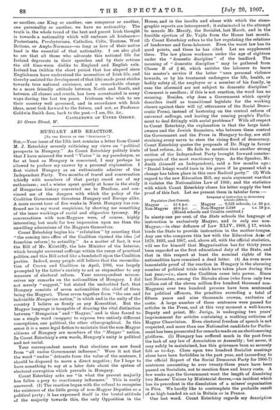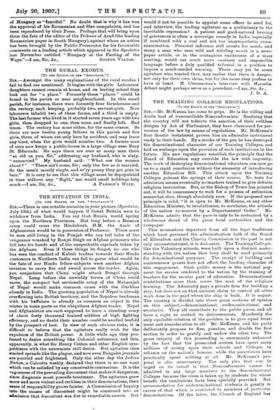HUNGARY AND REACTION.
[To THE EDITOR OF THE " SFECTATOR.1 SIR,—Your issue of the 13th inst. contains a letter from Count M. J. Esterhazy severely criticising my views on "political prospects in Hungary." As Count Esterinizy politely hints that I have misused the word " Viator " in my pseudonym, so far at least as Hungary is concerned, I may perhaps be allowed to preface my answer by a personal explanation. I first visited Hungary as an enthusiastic admirer of the Independent Party. Two months of travel and conversation (chiefly with members of that party) cured me of my enthusiasm ; and a winter spent quietly at home in the study of Hungarian history converted me to Dualism, and con- vinced me of the dangers with which the policy of the Coalition Government threatens Hungary and Europe alike. A more recent tour of five weeks in North Hungary has con- firmed me in my worst suspicions, by showing me something of the inner workings of racial and oligarchic tyranny. My conversations with non-Magyars were, of course, highly interesting, but made far leas impression upon me than the unwilling admissions of the Magyars themselves.
Count Esterhazy begins his " refutation " by asserting that
"the coming into office of the Coalition ripened the idea [of franchise reform] to actuality." As a matter of fact, it was the Bill of Mr. KristOffy, the late Minister of the Interior, which brought universal suffrage within the range of practical politics, and this Bill acted like a bombshell Upon the Coalition parties. Indeed, many people still believe that the reconcilia- tion of Crown and Coalition in April, 1906, was largely prompted by the latter's anxiety to act as stepmother to any measure of electoral reform. Your correspondent miscon- ceives my remarks on the nationalities of Hungary. I did not merely "suggest," but stated the undoubted fact, that Hungary consists of seven nationalities (the chief of them being the Magyar). These seven together form "the one and indivisible Hungarian nation," in which and in the unity of the country I believe as firmly as any Kossuthist. But the Magyar language is incapable of drawing the vital distinction between " Hungarian " and "Magyar," and is thus forced to use a single word (magyar) to express two entirely different conceptions, one political, the other ethnographical. In this sense it is a mere legal fiction to maintain that the non-Magyar citizens of Hungary are members of the "Magyar" nation. In Count Esterhizy's own words, Hungary's unity is political and not racial.
Your correspondent asserts that elections are now freed from "all undue Government influence." Were it not that the word " undue " detracts from the value of the sentence, I should be disposed to move a direct negative ; for I hope to have something to say at a later date about the system of electoral corruption which prevails in Hungary.
Count Esterhazy asks me "in what the present majority has fallen a prey to reactionary influences." This is easily answered. (1) The reaction began with the refusal to recognise the existence of the little group of non-Magyar Deputies as a political party ; it has expressed itself in the brutal attitude of the majority towards this, the only Opposition in the
House, and in the insults and abuse with which the steno- graphic reports are interspersed ; it culminated in the attempt to muzzle Mr. Meztify, the Socialist, last March, and in the forcible ejection of Dr. Vajda from the House last month. (2) Count Esterhezy refers to the law regulating the relations of landowner and farm-labourer. Even the worst law has its good points, and these he has cited. Let me supplement them. The law places workmen under the age of eighteen under the "domestic discipline" of the landlord. The meaning of "domestic discipline" may be gathered from Clause B of § 46, which entitles the labourer to leave his master's service if the latter "uses personal violence towards, or by his treatment endangers the life, health, or bodily safety of, the employee or a member of his family, in case the aforesaid are not subject to domestic disdipline." Comment is needless ; if this is not reaction, the word has no meaning. Besides, why does a Government which openly describes itself as transitional legislate for the working classes against their will (cf. utterances of the Social Demo- cratic Press), instead of hastening on the central reform of universal suffrage, and leaving the coming people's Parlia- ment to deal fittingly with social problems ? With all respect to Count Esterinizy, the explanation is that the large land- owners and the Jewish financiers, who between them control the Government and the Press in Hungary to-day, are still straining every nerve to stem the rising flood of democracy. Count Esterhazy quotes the proposals of Dr. Nagy in favour of land reform, Ste. He fails to mention that another strong section of the Independent Party brought forward counter- proposals of the most reactionary type. As the Speaker, Mr. Justh (himself an Independent), said a few months ago : "Daniel lranyi would turn in his grave if he guessed what a change has taken place in this once Radical party." (3) With regard to the new Education Bill, my main argument was that it violates the Nationalities Law of 1868; and the statistics with which Count Esterinizy closes his letter supply the best proof of this fact. Let me present them in tabular form :— Language of instruction in elementary Population (last Census). schools (1904-5).
Magyar ... 5P4 p.c. ... Magyar ... 9,522 schools, i.e. 58 p.c. Non-Magyar 48.6 p.c. ... Non-Magyar 3,248 „ i.e. 19 p.c. (Mixed schools and Croatia omitted.) In ninety-one per cent, of the State schools the language of instruction is exclusively Magyar, and in only one non- Magyar,—in clear defiance of Law XLIV., 1868, § 17, which binds the State to provide instruction in the mother-tongue. Any one who compares this law with the Education Acs of 1879, 1893, and 1907, and, above all, with the official statistics, will see for himself that Magyarisation has for thirty years been regarded as the first educational duty of the State, and that in this respect at least the nominal rights of the nationalities have remained a dead letter. (4) An even more lamentable proof of the reaction in Hungary is the alarming number of political trials which have taken place during the last year,—i.e., since the Coalition came into power. Since last November, among the Slovaks alone (who form only two million out of the eleven million five hundred thousand non- Magyars) over two hundred persons have been sentenced for political offences, the penalties exceeding a total of fifteen years and nine thousands crowns, exclusive of costs. A large number of these sentences were passed for articles in the Press, and at this very moment a well-known Deputy and priest, Mr. Juriga, is undergoing two years' imprisonment for articles containing a scathing criticism of Magyar Chauvinism. Even electoral freedom of speech is not respected, and more than one Nationalist candidate for Parlia- ment has been prosecuted for remarks made on an electioneering platform. (5) Hungary has suffered much in the past from the lack of any law of Association or Assembly ; but never, it may safely be maintained, has this grievance been so severely felt as to-day. Close upon two hundred Socialist meetings alone have been forbidden in the past year, and (according to the official Report of the Social Democrat Party for 1906-7) sentences amounting to over twenty-three years have been passed on Socialists, not to mention fines and heavy costs. A few weeks ago the Government went the length of dissolving two Masons' Unions by Ministerial decree,—an incident which has its precedent in the dissolution of a miners' organisation in Pecs. We hardly like to contemplate the probable result of so high-handed an act in Britain or in France.
One last word. Count Esterbazy regards my description of Hungary as "fanciful." No doubt that is why it has won the approval of his Roumanian and Slav compatriots, and has been reproduced by their Press. Perhaps that will bring upon them the fate of the editor of the Tribuna of Arad (the leading Roumanian paper in South Hungary), against whom an action has been brought by the Public Prosecutor for his favourable comments on a leading article which appeared in the Spectator last November entitled "Hungary at the Parting of the







































 Previous page
Previous page